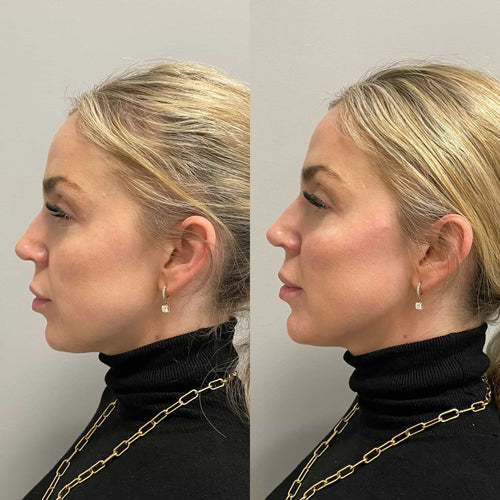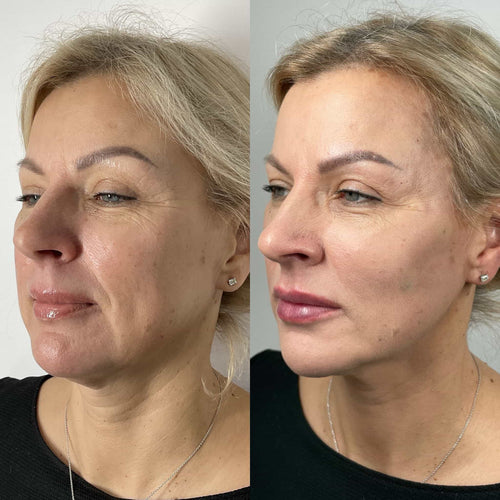Arrange Your Dermal Filler Session with Dr. Laura Geige
Legal Minimums
Age Restrictions by State
Legal minimums for cosmetic procedures like lip filler vary by state and are primarily determined by age restrictions on minors and parental consent laws.
Generally, a person must be 18 years old to legally consent to medical procedures, including lip fillers, in most US states. However, some states have exceptions that allow for procedures with parental consent at younger ages, usually starting around 16 or 17.

It’s crucial to note that specific state laws can differ, and it’s always best to consult with a licensed medical professional and review the regulations in your jurisdiction.
While some states may allow for lip filler treatments at younger ages with parental consent, many providers choose to maintain a stricter policy of 18 years or older due to the potential risks and complexities associated with cosmetic procedures.
Factors influencing these age restrictions include the understanding of risks involved, maturity levels, and potential long-term effects on developing bodies.
It’s essential for anyone considering lip filler, regardless of age, to thoroughly research the procedure, understand potential side effects and complications, and select a qualified and experienced provider.
Federal Regulations
Legal minimums for cosmetic procedures like lip fillers vary widely across jurisdictions and are primarily determined at the state level.
**Federal regulations** generally do not set specific age limits for cosmetic procedures. The **Food and Drug Administration (FDA)** regulates the safety and efficacy of injectables like hyaluronic acid fillers, but its focus is on ensuring product quality and appropriate use by licensed professionals, rather than dictating patient age.
States often establish minimum ages for cosmetic procedures through licensing laws or statutes that govern the practice of medicine. These laws may set a specific age limit (e.g., 18 years old) or require parental consent for minors.
It is crucial to note that even if a state allows lip fillers at a particular age, individual clinics or practitioners may have their own policies regarding minimum age requirements.

Furthermore, ethical considerations often influence a practitioner’s decision to provide treatment to someone under the legal minimum age. Factors such as maturity level, understanding of risks and benefits, and potential psychological impact are carefully considered.
If you are interested in lip fillers, it is essential to consult with a qualified healthcare professional who can assess your individual circumstances and provide accurate information about legal requirements and appropriate treatment options.
Medical Considerations
Maturity of Facial Features
Medical considerations regarding lip filler are crucial for anyone considering this cosmetic procedure. It’s important to consult with a qualified and experienced medical professional, ideally a board-certified plastic surgeon or dermatologist.
One primary consideration is age. While there isn’t a strict legal minimum age for lip fillers, most practitioners recommend waiting until individuals have reached full facial maturity, which is typically around the late teens to early twenties.
The face continues to develop and change throughout adolescence and into young adulthood. Facial bones and soft tissues are still growing, meaning lip augmentation at a younger age could lead to unpredictable results or complications as the face matures further.
Mature facial features contribute to aesthetically pleasing lip augmentation outcomes. Well-defined bone structure and stable tissue provide a better foundation for filler placement, resulting in more natural-looking and lasting enhancement.
Medical history also plays a significant role. Individuals with certain conditions such as bleeding disorders, autoimmune diseases, or allergies may be unsuitable candidates for lip fillers.
A thorough consultation with a medical professional allows them to assess individual risks, discuss expectations realistically, and determine the most appropriate course of action.
Book Your Dermal Filler Consultation with Dr. Laura Geige Today
Potential Complications
Medical Considerations and Potential Complications associated with lip filler are important factors to discuss before undergoing the procedure.
Here’s a breakdown:
-
Age Restrictions: While there isn’t a strict legal age limit for lip fillers, most reputable practitioners won’t treat individuals under 18 due to ethical concerns and the potential for complications in developing facial structures.
-
Underlying Health Conditions: Individuals with certain health conditions, such as bleeding disorders, autoimmune diseases, or allergies to lidocaine (a common anesthetic used in lip fillers), may not be suitable candidates. It’s crucial to disclose all medical history to your practitioner.
-
Medications and Supplements: Some medications and supplements can increase the risk of complications, such as bruising or bleeding. Inform your doctor about any medications you’re currently taking.
Potential Complications:
-
Bruising and Swelling: These are common side effects that usually subside within a few days to a week.
-
Infection: While rare, infection can occur if proper sterilization techniques aren’t followed. Seek immediate medical attention if you experience redness, warmth, or pus at the injection site.
-
Allergic Reactions: Some individuals may be allergic to hyaluronic acid, a common ingredient in lip fillers. Mild reactions include itching and redness, while severe reactions can be life-threatening.
-
Asymmetry or Uneven Results: Injecting too much filler or injecting it unevenly can result in an unnatural appearance. It’s important to choose an experienced injector.
-
Lumps and Nodules: These can form under the skin if the filler is not properly dispersed.
-
Vascular Occlusion: This serious complication occurs when a blood vessel is blocked by filler, leading to tissue damage. It’s rare but requires immediate medical attention.
Book Your Dermal Filler Appointment with Dr. Laura Geige Today
It’s crucial to consult with a qualified and experienced practitioner to discuss your individual medical history, expectations, and potential risks before deciding to get lip fillers.
Beyond the Law: Ethical Implications
Pressure on Youthful Appearance
“Beyond the Law: Ethical Implications, Pressure on Youthful Appearance” delves into the complex ethical terrain surrounding cosmetic procedures, particularly among young people.
One primary concern is the pressure exerted on youth to conform to idealized standards of beauty. Social media platforms and advertising often portray a narrow and unrealistic depiction of attractiveness, leading to body dissatisfaction and a desire for cosmetic enhancement.
This pressure can be particularly intense for adolescents and young adults who are still developing their identities and sense of self-worth. They may feel compelled to undergo procedures like lip fillers to fit in, gain acceptance, or improve their chances of success in social and professional spheres.
The ethical implications become even more pronounced when considering the potential risks associated with cosmetic procedures.
Lip fillers, while relatively minor compared to other surgeries, can still cause complications such as infection, swelling, bruising, and uneven results. In younger individuals whose facial structures are still evolving, these risks may be magnified due to the body’s natural changes.
Furthermore, the long-term effects of repeated filler injections are not fully understood. There is a risk of developing dependence on procedures to maintain a certain look, which can lead to a vicious cycle of dissatisfaction and further interventions.
Another ethical dilemma lies in the question of consent. While laws regarding the age at which individuals can consent to cosmetic procedures vary by jurisdiction, it is crucial to consider the maturity and understanding of young people when it comes to such decisions.
Adolescents may not fully grasp the potential risks and long-term consequences of these procedures, or they may be unduly influenced by peer pressure or parental expectations.
Ultimately, a nuanced approach is needed that balances individual autonomy with the protection of young people from undue harm. Open and honest conversations about beauty standards, realistic expectations, and the potential risks and benefits of cosmetic procedures are essential for empowering youth to make informed decisions about their bodies and well-being.
Long-Term Effects and Informed Consent
Beyond the realm of simple cosmetic enhancements, the increasing accessibility of procedures like lip filler raises critical ethical considerations. These extend far beyond questions about legal age restrictions and delve into the complex interplay between individual autonomy, societal pressures, and long-term consequences.
One crucial ethical dilemma revolves around informed consent. While a legal guardian’s permission might suffice for minors seeking lip fillers, ensuring true understanding of potential risks and benefits is paramount. Adolescents may be particularly vulnerable to peer pressure or unrealistic beauty standards perpetuated by social media, impacting their ability to make fully informed decisions.
Long-term effects of cosmetic procedures are often underplayed or poorly understood, especially in younger individuals whose faces are still developing. Lip fillers can cause swelling, bruising, and allergic reactions. More serious complications include infections, permanent tissue damage, and an altered facial structure that may not age gracefully.
Societal pressures contribute to the ethical quandary surrounding lip filler access for minors. The relentless pursuit of “ideal” appearances often begins in adolescence, with social media amplifying these pressures. This creates a challenging environment where teenagers might feel compelled to conform, potentially compromising their well-being for fleeting aesthetic validation.
Furthermore, the normalization of cosmetic procedures at a young age raises questions about societal values. Does prioritizing physical appearance over other developmental aspects send the wrong message? Are we inadvertently fostering a culture where self-worth is tied to external validation?
Ultimately, the ethical implications of lip filler access for minors demand careful consideration from parents, healthcare professionals, and society as a whole. A balanced approach is needed that prioritizes informed consent, realistic expectations, and long-term well-being over fleeting aesthetic ideals.
MS Style and Grace MS Style and Grace Ring of the Reeks Cycle Lottie London Aesthetics
- Why Can’t You Vape After Lip Filler - October 30, 2025
- What Is The Best Filler For Crepey Neck? - October 29, 2025
- What Are The 7 Levels Of Being High? - October 27, 2025
